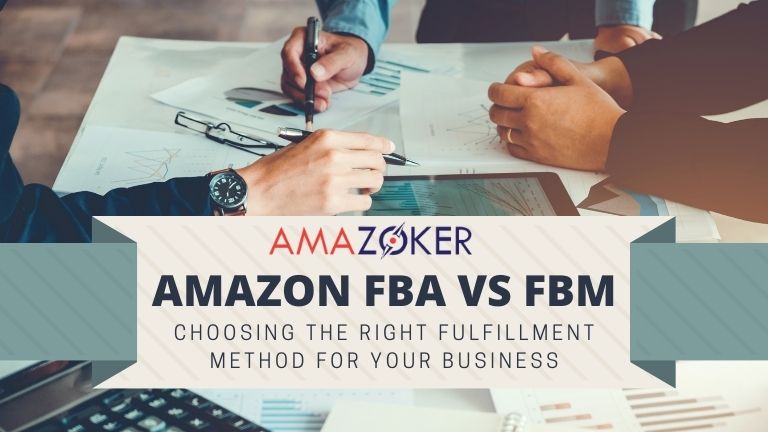With its vast customer base and streamlined logistics, Amazon has become the go-to platform for many entrepreneurs looking to sell their products online. However, when it comes to fulfilling orders, sellers are faced with a crucial decision: should they opt for Amazon FBA vs FBM. Understanding the differences, advantages, and disadvantages of these two methods is crucial for sellers looking to optimize their operations and maximize their success on the platform.
Table of Contents
What’s the difference between Amazon FBA and FBM?
Amazon FBA vs FBM represent two distinct approaches to order fulfillment on the platform.
Fulfillment by Amazon (FBA) is an exclusive service offered by Amazon, enabling sellers to conveniently store their merchandise in Amazon’s state-of-the-art fulfillment centers. Once a customer makes a purchase, Amazon takes charge of the entire process, including picking, packing, and shipping the product on behalf of the seller. Additionally, FBA provides customer service and handles returns.
On the other hand, Fulfillment by Merchant (FBM) requires sellers to store, pack, and ship their products themselves. Sellers are also responsible for customer service and managing returns. This means that with FBM, sellers have more control over the entire fulfillment process, from storage to delivery.
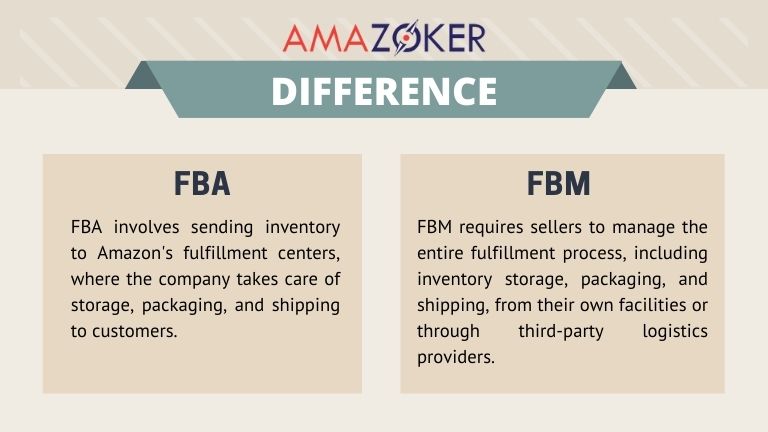
Amazon FBA and FBM diverge in terms of their approaches to fulfillment
Amazon FBA vs FBM Comparison
To provide a comprehensive comparison of Amazon FBA vs FBM, let’s examine the key advantages and disadvantages of each method.
Amazon FBA
Here are some significant advantages of using FBA:
- Prime eligibility: Products fulfilled through FBA are often eligible for Amazon Prime, which can significantly boost sales and customer satisfaction.
- Time-saving: FBA relieves sellers of the burden of packaging and shipping orders, allowing them to focus on other aspects of their business.
- Customer service: Amazon handles customer inquiries and returns for FBA orders, easing the seller’s customer service workload.
- Multi-channel fulfillment: FBA allows sellers to fulfill orders from other sales channels, not just Amazon.
Disadvantages of Using Amazon FBA:
- Fees: FBA entails storage, fulfillment, and referral fees, which can eat into a seller’s profit margins, especially for low-margin products.
- Limited control: Sellers relinquish control over the fulfillment process, which can lead to issues with inventory management and shipping delays.
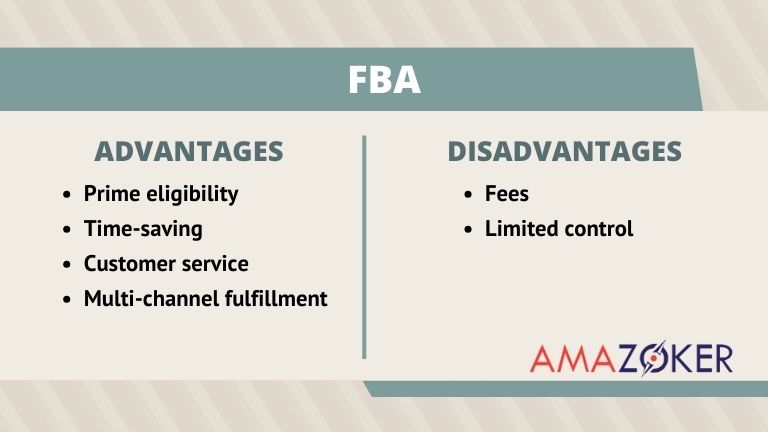
The advantages and disadvantages of Amazon FBA
Amazon FBM
Some of the advantages of using Amazon FBA in comparison to FBA are:
- Cost-effective: FBM can be more cost-effective for sellers with higher-margin products, as they can avoid certain FBA fees.
- Greater control: Sellers have full control over the fulfillment process, allowing for more flexibility in managing inventory and shipping.
- Flexibility: FBM allows sellers to customize shipping options and packaging to suit their specific needs.
Disadvantages of Amazon FBM:
- Time and effort: Fulfilling orders manually can be time-consuming and labor-intensive, especially as sales volume increases.
- Prime eligibility: FBM orders are not automatically Prime-eligible, potentially putting sellers at a disadvantage in the competitive Amazon marketplace.
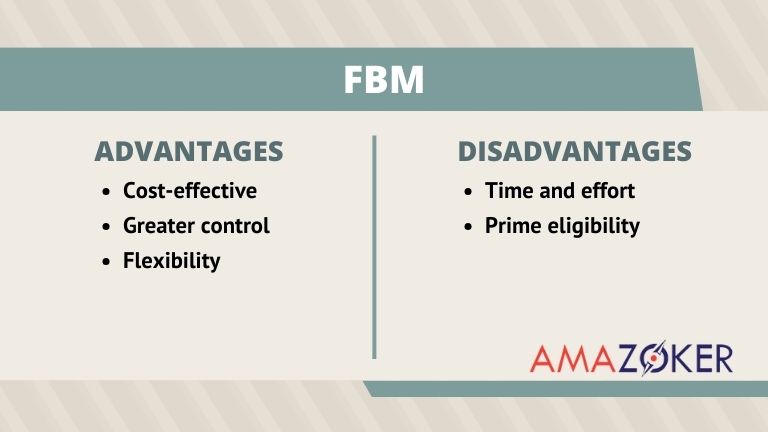
The advantages and disadvantages of Amazon FBM
Each option has its own set of advantages and disadvantages, so it’s important to carefully consider your priorities and operational capabilities before making a choice. If you prioritize Prime eligibility, streamlined logistics, and are willing to pay higher fees for these benefits, then FBA might be the better option for you. Conversely, if you value cost control, branding opportunities, and direct customer interaction, and are prepared to manage the fulfillment process yourself, then FBM could be the more suitable choice. It’s essential to evaluate your unique business requirements to determine which fulfillment method aligns best with your goals and capabilities.
Which Amazon fulfillment method should sellers use?
The decision to choose between FBA and FBM depends on various factors, including a seller’s business model, scale, and operational capabilities. Understanding the circumstances under which each method is most suitable is essential for making an informed choice.
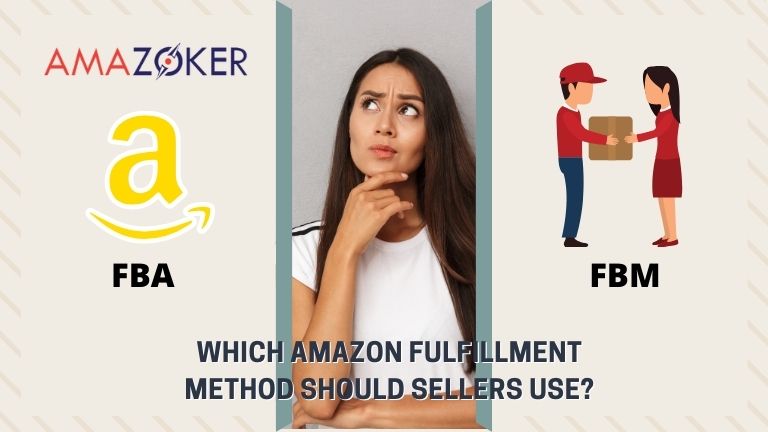
What is the recommended Amazon fulfillment method for sellers to utilize?
When would it be advisable to go for FBA?
It would be advisable to choose Amazon FBA (Fulfillment by Amazon) when you prioritize Prime eligibility, streamlined logistics, and are willing to pay higher fees for these benefits. FBA is an ideal choice for sellers who:
- Have limited storage space or logistical capabilities.
- Want to leverage Amazon’s Prime program to attract more customers.
- Prefer to offload the responsibility of order fulfillment and customer service to Amazon.
- Expanding customer base and reaching a wider audience
- Accessing Amazon’s extensive customer base and leveraging the trust and convenience associated with Prime-eligible products
- Increased visibility, sales, and customer satisfaction, especially among Prime members
- Handling higher sales volumes and scaling the business without the logistical burden of fulfillment and storage
By considering these factors, sellers can determine if FBA aligns with their business goals and operational needs.
When would it be advisable to go for FBM?
It would be advisable to choose Fulfillment by Merchant (FBM) on Amazon when you prioritize cost control, branding opportunities, and direct customer interaction, and are prepared to manage the fulfillment process yourself. FBM may be the preferred option for sellers who:
- Have higher-margin products and want to minimize fulfillment costs.
- Desire greater control over the packaging, branding, and shipping of their products.
- Are equipped to handle the logistical demands of order fulfillment independently.
- Want to customize the shipping and packaging experience to align with their brand identity and customer expectations.
- Have specific packaging or handling requirements that may not align with Amazon’s FBA guidelines.
- Operate in niche markets or sell unique products that require personalized handling or shipping methods.
- Prefer to have direct and hands-on involvement in the fulfillment process to ensure quality control and customer satisfaction.
By taking into account these factors, sellers can assess whether FBM is in line with their business objectives and operational capacities.
Whether you opt for the convenience and reach of FBA or the control and customization of FBM, understanding the nuances of each fulfillment method is essential for achieving sustainable growth and profitability in the competitive e-commerce landscape.
7 key factors to consider before choosing a fulfillment method on Amazon
When deciding between Amazon FBA vs FBM, sellers should carefully evaluate the following factors to determine the most suitable fulfillment method for their business:
- Inventory Size and Turnover: Consider the volume and turnover rate of your inventory to determine whether FBA’s storage and quick shipping capabilities align with your needs.
- Shipping Costs and Speed: Assess the impact of shipping costs and speed on customer satisfaction and your bottom line, considering the differing shipping models of FBA and FBM.
- Control and Customization: Evaluate the importance of maintaining control over the fulfillment process and the ability to customize packaging and branding.
- Costs and Fees: Compare the costs and fees associated with FBA and FBM, including storage fees, fulfillment fees, and additional charges.
- Product Characteristics: Analyze the nature and characteristics of your products to determine whether they are better suited for FBA or FBM in terms of size, fragility, and special requirements.
- Seasonal Variations: Consider the impact of seasonal fluctuations in demand and sales on your fulfillment strategy, as FBA and FBM may offer different advantages during peak seasons.
- Customer Service: Factor in the importance of customer service and handling returns, as FBA provides comprehensive customer support, while FBM requires sellers to manage these aspects independently.
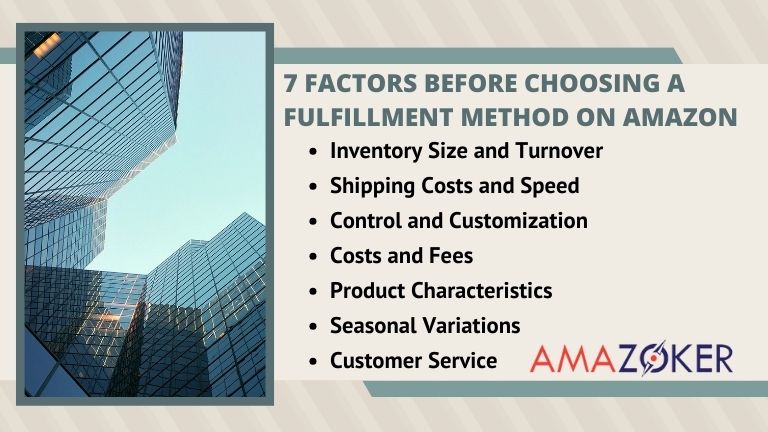
It is crucial to consider seven key factors before selecting a fulfillment method on Amazon
By carefully evaluating these factors, sellers can make an informed decision that aligns with their business objectives and customer needs.
In conclusion, the decision to use Amazon FBA vs FBM is a critical one for sellers, as it directly impacts operational efficiency, customer experience, and overall business performance. By carefully evaluating the advantages, disadvantages, and specific needs of your business, you can make an informed choice that maximizes your potential for success on the Amazon platform.
Read more:







